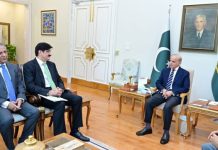Chief Justice of Pakistan Mian Saqib Nisar, who was heading a three-judge bench, observed during the hearing that as per senior counsel Ahmer Bilal Soofi, who was appointed amicus curiae (friend of the court), only NAB has the authority to make efforts for Haqqani’s extradition to Pakistan after its chairman issues warrants against the former envoy.
 “There are hurdles in [bringing wanted persons back to the country] due to a lack of extradition treaties between Pakistan and other countries,” the top judge remarked.
“There are hurdles in [bringing wanted persons back to the country] due to a lack of extradition treaties between Pakistan and other countries,” the top judge remarked.He added, however, that there was a need to explore NAB’s agreements with the United Nations Security Council under which the extradition of accused suspects is possible.
While giving NAB the task to bring back the former ambassador, the apex court also ordered the parliament to legislate on the matter of bringing wanted Pakistanis back home.
The court directed the parliament to legislate on extradition agreements with foreign countries within a month.
The bench also ordered NAB to submit a written reply in one week about steps it will take to bring Haqqani to Pakistan. The hearing was adjourned for a week.
FIA submits progress report
Meanwhile, in a progress report submitted to the Supreme Court, the Federal Investigation Agency (FIA) stated that an interim challan of the Memogate case was submitted in the Court of Special Judge Central, Islamabad on August 7, 2018.
The accused is still at large and absconding in the US, the report stated, adding that the process to blacklist Haqqani’s Pakistani passport is underway.
According to the report, the National Central Bureau (NCB) of Interpol in Washington “has tentatively confirmed that the accused has been located in the United States”.
It said the interior ministry will forward a request for his extradition to the foreign ministry after seeking the federal cabinet’s approval. The foreign ministry will then forward the request to the US government after which FIA will coordinate the matter through the US Embassy in Islamabad, as well as NCB- Interpol.
The agency disclosed that several requests to issue ‘red notice’ against Haqqani are pending decision at the Interpol Secretariat in France.
On a suo motu, the SC had taken up a case pertaining to steps being taken by the government to ensure implementation of an earlier SC order of bringing Haqqani back home.
On June 4, 2013, a nine-judge SC bench, headed by then chief justice Iftikhar Muhammad Chaudhry, had directed the then interior secretary to adopt legal measures ensuring the return of Haqqani to Pakistan. The court had also hinted at adopting coercive measures in view of the continued refusal of Haqqani to appear before it and honour the commitment he made to come whenever called.
Haqqani was at the centre of a controversy for sending a memorandum allegedly to former US military chief Admiral Mike Mullen, seeking direct US intervention to avert a possible overthrow of the civilian government by the military against the backdrop of the May 2, 2011 US raid on the Abbottabad compound that killed Al Qaeda chief Osama bin Laden.
Later, the SC constituted a judicial commission which had on June 12, 2012 held Haqqani as the originator and architect of the memo.



